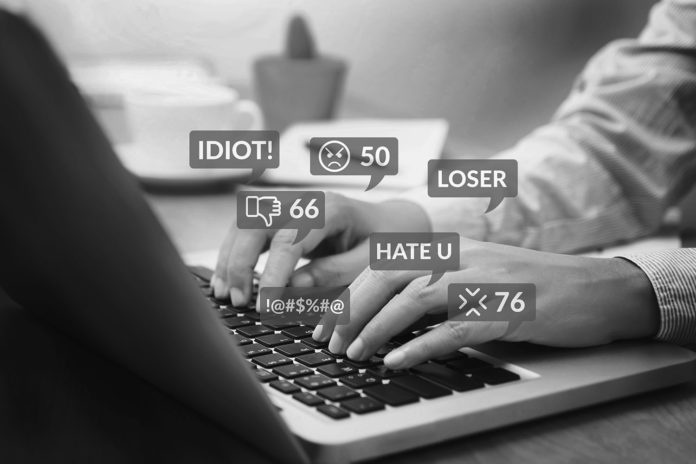I had this fleeting thought the other day, the kind that keeps flashing from a dark corner of my mind like a lighthouse.
It’s been there for a while so, as I’m wont to do, it’s time to share it. I’d appreciate some feedback or dialogue on this and, especially — for reasons that will become clear in a moment — ideas for improvement.
You’ve heard of the internet, right? Of course you have. The only reason you’re reading these words of wisdom is because of it. It’s responsible for some of man’s greatest advancements.
- Instantaneous sharing of information
- The wonder and joy of human engagement through social media
- A world of knowledge just a Google search away
The internet has given hate and hatred the kind of spotlight we never intended.
The downside of the internet
But, unbeknownst to most of us, something was tucked into the glove box of the speeding roadster that is the internet. That something, my friends, is HATE. The internet has given hate and hatred the kind of spotlight we never intended. Actually, it hasn’t been just a spotlight. Hate and everything it infects has had a seat at the table of national discourse for the better part of six months. It’s always been there, of course, since the beginning of time. But now, it seems, more and more people are feeling emboldened to bare their teeth and put up their dukes — virtually, of course — to tear others down.
The playground for this hate, of course, is social media, with the “hotspot” being comment sections. If you’re unfamiliar, take a few minutes and stroll virtually through YouTube and read some comments. Visit the website of any media source covering the pandemic and read the comments on pandemic-related stories. Spend 30 seconds on Twitter. You’ll see.
Now, it seems, more and more people are feeling emboldened to bare their teeth and put up their dukes — virtually, of course — to tear others down.
The kind of pure and condensed vitriol comment sections give rise to is nearly enough to make you cut the cord, go off grid and end your cooperation with the empire of civilized society … OK, maybe it’s not quite that bad, but it’s definitely enough to make you pound a fist or two on the counter and wonder aloud “What the heck is wrong with people??!!”
You’ve probably seen this in action. An article about a controversial issue prompts a commenter to say something, which in turn prompts another to respond. The first few exchanges may be civil, but things often spiral out of control and end with name calling, stereotyping and hasty (and rude) exits.
Comment sections, on their face, seem like a great way to get people talking about the issues. In theory, they can be a wonderful tool to encourage discussion. On a YouTube video for a Springsteen song, a comment section can provide a place for fans to gather virtually and share their fandom. On a news article about government spending, people can share thoughts on public policy. On a Facebook or Instagram post, people can say how cute your kids are.
Anonymity
The problem is, in many cases, people can be anonymous. So the showering praises from Springsteen fans can be polluted with personal attacks on music tastes. That news article comment you made can be dismissed by a fellow anonymous reader as idiotic. (Your Facebook post about your cute kid is probably safe, depending on your relationship with your family.)
Civil discourse devolves into a contest of who is better at listening to respond instead of listening to understand.
Anonymity is a powerful tool. But in this context, and when combined with the limitless ability to say anything with no consequence, civil discourse devolves into a contest of who is better at listening to respond instead of listening to understand. These are two very different things, and we’d be wise to avoid becoming a master of the former. We’d be even wiser to avoid a habit of using anonymity to vent frustrations and hash out differences with other anonymous commenters. Unchecked, it could potentially contribute to the already massive and growing heap of negative, hate-fueled energy in the world.
When the creators of the internet decades ago were stringing together networks and coming up with the protocols for computers to share information, they probably never thought some of that information would get people killed. They probably never dreamed people would hide behind the anonymity of a fake name and use that anonymity to hurl vile insults. And, being that they weren’t soothsayers, they had no way of knowing that we’d turn an otherwise great idea into a cesspool of intolerance, cravenness and judgment.
Yet here we are.
Just like us
I’ve been rewatching the Showtime series “Dexter” over the past few weeks. The show follows the fictional life of forensic blood spatter analyst Dexter Morgan, who moonlights as a serial killer who kills killers. He was raised by a foster father who, recognizing Dexter’s unique psychopathic personality, trained Dexter to use his dark urges for “good.”
The person who did this is like us: good and evil.
In a deceptively introspective scene from season 2, Dexter — trying to avoid being discovered by feigning a heroin addiction — brings his drug rehab program sponsor, Lila, to work to show her the gruesome work he does daily with corpses. When he asks her what she thinks of someone who could do such a thing to another person, Lila says something that has always stuck with me: “The person who did this is like us: good and evil.”
What she said is true. We’re all capable of extreme good or extreme evil. The overwhelming majority of us can prevent ourselves from becoming serial killers, obviously. But a larger number can’t seem to prevent themselves from being bullies online.
What to do?
I feel like the nation that invented a tool to transform just about every aspect of society can come up with a way to avoid having that tool used to torment and hurt people.
What do you guys think would be a good solution for solving the obvious problem of comment section bullies and blowhards? Verification of identity to allow comments? Elimination of comment sections? Better moderation of comments to avoid inappropriate discourse? And who will be the judge of what’s “appropriate”?
I’d love to hear your thoughts on this. Yup, comments are open below!
~~~
Changing the Narrative is a regular column by Robb Murray where Robb will continue his long tradition of speaking his heart into the lives of the people of the Greater Mankato Area.




